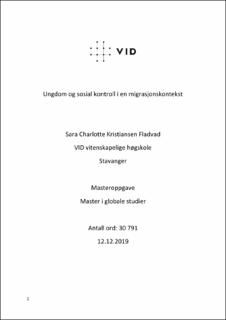| dc.contributor.author | Fladvad, Sara Charlotte Kristiansen | |
| dc.coverage.spatial | Norway | en_US |
| dc.date.accessioned | 2020-02-14T09:23:41Z | |
| dc.date.available | 2020-02-14T09:23:41Z | |
| dc.date.issued | 2019-12 | |
| dc.identifier.uri | https://hdl.handle.net/11250/2641696 | |
| dc.description | Master's thesis in Global Studies. VID Specialized University, Stavanger, December 2019 | en_US |
| dc.description.abstract | Denne studien utforsker ungdommers opplevelse av sosial kontroll i en migrasjonskontekst
med følgende problemstilling
Hvordan opplever ungdom sosial kontroll i en migrasjonskontekst?
Materialet består av kvalitative intervjuer med 14 ungdommer i Oslo med migrasjonserfaring. Studien viser hvordan migrasjonsprosesser, herunder blant annet motivasjoner, årsaker og sosial støtte ser ut til å påvirke hvordan ungdommene opplever sosial kontroll utøvd av både foreldre og andre. Samtidig fremstår kontroll som skal fremme, forebygge eller sanksjonere adferd å inngå i et samspill med faktorer knyttet til
migrasjonsprosessen samt til familieliv og oppdragelse i en migrasjonskontekst. Opplevelse av tilhørighet, deltagelse, inkludering og ekskludering og konformitetspress fra arenaer preget av både opprinnelsesland og Norge ser dessuten ut til å kunne både fremme og hemme negativ eller begrensende sosial kontroll. Fra en annen synsvinkel fremstår opplevelsen og utøvelsen av sosial kontroll å være nært knyttet til konteksten den foregår i. Studien beskriver sosial kontroll i en migrasjonskontekst som et komplekst fenomen hvor det er viktig å rette blikket mot forhold ved individer, familier, migrantmiljøer,
transnasjonale miljøer og ved det norske majoritetssamfunnet. | en_US |
| dc.description.abstract | This study explores adolescents' experience of social control in the context of migration, with the following research question
How do adolescents experience social control in the context of migration?
The material consists of qualitative interviews with 14 young people in Oslo with migration experience. The study shows how processes of migration, including motivations for migrations, causes and social support, seems to affect how young people experience social control exercised by both parents and others. At the same time, social control to promote, prevent or sanction behavior appears to interact with factors related to the process of migration as well as with family life and upbringing in a context of migration. Meanwhile, experience of belonging, participation, inclusion, exclusion and conformity in groups related to the country of origin and Norway appears to promote as well as inhibit negative social
control. From another point of view, the experience and exercise of social control seems to be closely linked to the context in which it takes place. The study describes social control in a migration context as a complex phenomenon. Focus on aspects related to individuals, families, migrant communities, transnational communities and to the Norwegian majority community appears to be important. | en_US |
| dc.language.iso | nob | en_US |
| dc.subject | ungdom | en_US |
| dc.subject | youth | en_US |
| dc.subject | sosial kontroll | en_US |
| dc.subject | social control | en_US |
| dc.subject | migrasjon | en_US |
| dc.subject | migration | en_US |
| dc.subject | transnationality | en_US |
| dc.subject | transnasjonalitet | en_US |
| dc.title | Ungdom og sosial kontroll i en migrasjonskontekst | en_US |
| dc.type | Master thesis | en_US |
| dc.description.version | submittedVersion | en_US |
| dc.subject.nsi | VDP::Samfunnsvitenskap: 200 | en_US |
| dc.source.pagenumber | 97 | en_US |
